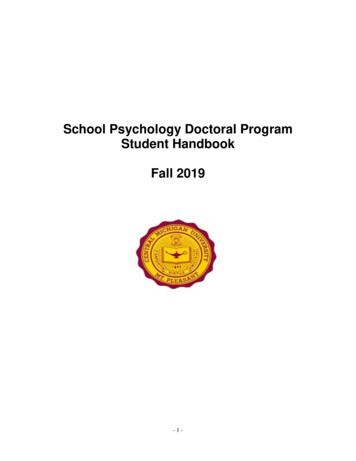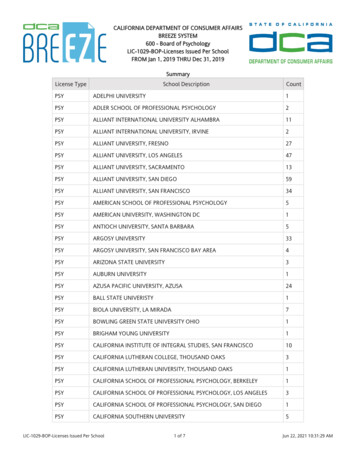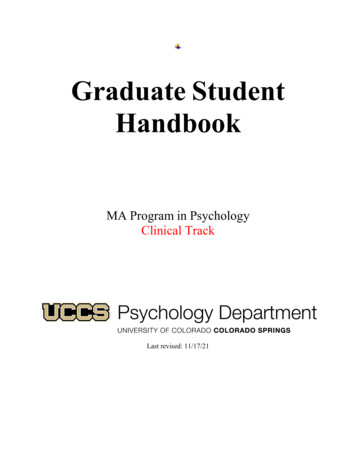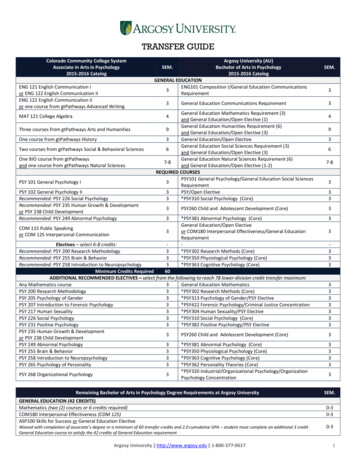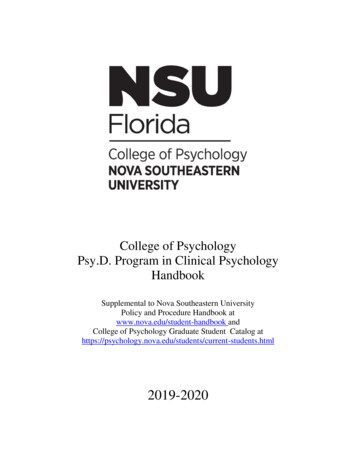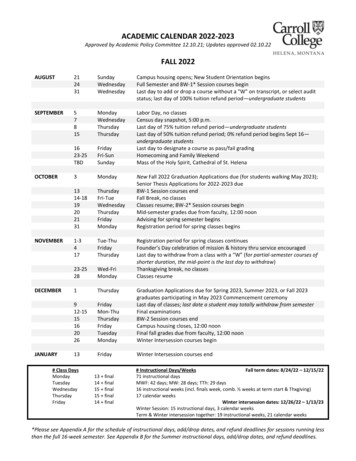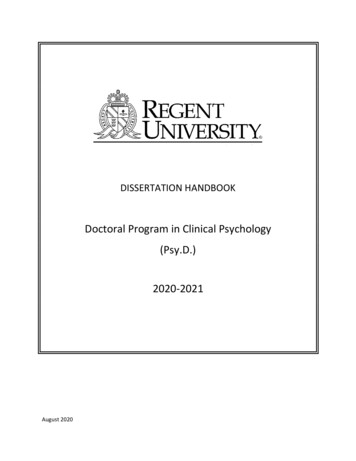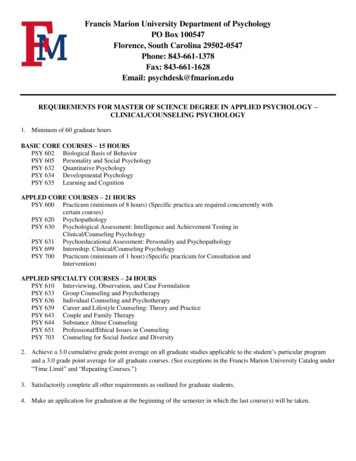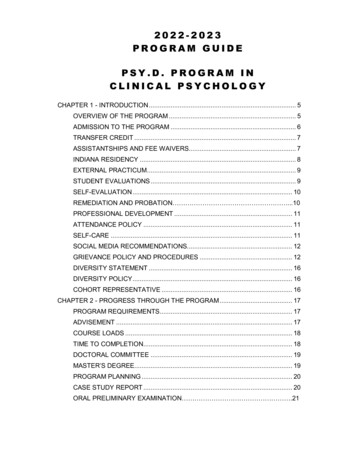
Transcription
2022-2023PROGRAM GUIDEPSY.D. PROGRAM INCLINICAL PSYCHOLOGYCHAPTER 1 - INTRODUCTION . 5OVERVIEW OF THE PROGRAM . 5ADMISSION TO THE PROGRAM . 6TRANSFER CREDIT . 7ASSISTANTSHIPS AND FEE WAIVERS. 7INDIANA RESIDENCY . 8EXTERNAL PRACTICUM . 9STUDENT EVALUATIONS . 9SELF-EVALUATION . 10REMEDIATION AND PROBATION .10PROFESSIONAL DEVELOPMENT . 11ATTENDANCE POLICY . 11SELF-CARE . 11SOCIAL MEDIA RECOMMENDATIONS. 12GRIEVANCE POLICY AND PROCEDURES . 12DIVERSITY STATEMENT . 16DIVERSITY POLICY . 16COHORT REPRESENTATIVE . 16CHAPTER 2 - PROGRESS THROUGH THE PROGRAM . 17PROGRAM REQUIREMENTS. 17ADVISEMENT . 17COURSE LOADS . 18TIME TO COMPLETION. 18DOCTORAL COMMITTEE . 19MASTER’S DEGREE. 19PROGRAM PLANNING . 20CASE STUDY REPORT . 20ORAL PRELIMINARY EXAMINATION .21
ADMISSION TO DOCTORAL CANDIDACY . 21EXTERNAL PRACTICUM . 21DISSERTATION . 21CLINICAL INTERNSHIP . 22GRADUATION . 22TIME LIMITATIONS. 23LEAVE OF ABSENCE . 23CHAPTER 3 - CURRICULUM . 25COURSE REQUIREMENTS OF THE PROGRAM. 25THE PSYCHOLOGY CORE (27 CREDIT HOURS) . 25THE CLINICAL / PROFESSIONAL CORE (46 HOURS) . 26ELECTIVES (12 HOURS) . 29DISSERTATION (12 HOURS) . 29SEQUENCE OF COURSES . 29CHAPTER 4 - SELECTION OF THE DOCTORAL COMMITTEE . 30CHAPTER 5 - MS IN PSYCHOLOGY FOR STUDENTS IN THE PSY.D. PROGRAM . 32COURSEWORK AND PORTFOLIO . 32CLINICAL SKILLS . 32RESEARCH SKILLS . 33CHAPTER 6 – CASE STUDY REPORT AND ORAL PRELIMINARY EXAM . 36CASE STUDY REPORT . 36EVALUATION OF PERFORMANCE ON CASE STUDY REPORT . 37ORAL PRELIMINARY EXAM . 37EVALUATION OF PERFORMANCE ON ORAL EXAMINATION. 38RE-TAKING THE EXAMINATION . 39CHAPTER 7 - CLINICAL PRACTICUM POLICIES AND PROCEDURES. 40ELIGIBILITY . 41SELECTION OF EXTERNAL CLINICAL PRACTICUM SITES . 42THE PRACTICUM TRAINING AGREEMENT . 43MONITORING AND SUPPORT . 44MAINTAINING COMMUNICATION. 44FEEDBACK . 45CHAPTER 8 - THE DISSERTATION . 46Page 2
NATURE OF THE DISSERTATION . 47THE DISSERTATION PROPOSAL . 47WRITTEN PRESENTATION OF THE DISSERTATION . 49THE ORAL DEFENSE OF THE DISSERTATION . 50THE FINAL SUBMISSION OF THE DISSERTATION . 51CRITICAL DATES FOR COMPLETION OF THE DISSERTATION . 51CHAPTER 9 - THE CLINICAL INTERNSHIP . 52PROGRAM REQUIREMENTS FOR INTERNSHIP . 52SELECTING AN INTERNSHIP . 53SOURCES OF INFORMATION REGARDING INTERNSHIPS . 54APPLYING FOR INTERNSHIP . 54INTERNSHIP COMMITTEE . 55INTERVIEWS . 56RANKINGS . 56PROGRAM APPROVAL . 56NOTIFICATION OF MATCH RESULTS . 57COORDINATION AND EVALUATION . 57CHAPTER 10 - GRADUATION REQUIREMENTS . 58APPENDIX A PSY.D. PROGRAM COMPETENCIES AND OBJECTIVES . 61APPENDIX B CURRICULUM MAPPING & COURSES THAT COVER SPECIFICCOMPETENCIES . 65APPENDIX C GRADUATE ASSISTANTSHIP/FELLOWSHIP & POLICIES,PROCEDURES AND GUIDELINES. 67APPENDIX D STUDENT EVALUATION FORMS . 72APPENDIX E YEAR END EVALUATION . 101APPENDIX F PROGRAM OF STUDY (SCHEDULE OF STUDY) FORMS . 105APPENDIX G SOCIAL MEDIA RECOMMENDATIONS . . 107APPENDIX H POLICY ON DIVERSITY FOR GRADUATE PROGRAMSIN PSYCHOLOGY (REVISED APR 2015) . 108APPENDIX I MASTERS PORTFOLIO . 111CLINICAL SKILLS . 112RESEARCH SKILLS . 113APPENDIX J EVALUATION OF PERFORMANCE ON ORAL EXAMINATION. 114Page 3
APPENDIX K PLACEMENT AGREEMENT . 115APPENDIX L CLINICAL PLACEMENT/PLACEMENT PROGRESS REPORT .118APPENDIX M GUIDELINES FOR REQUIREMENTS BY YEAR IN THE PROGRAM . 122APPENDIX N CLINICAL COMPETENCIES FORM . . . . 134APPENDIX O DISSERTATION EXPECTATIONS ISU PSY.D. PROGRAM (REV 6/2018) .136APPENDIX P TYPICAL COURSE SEQUENCE ALL YEARS . 138APPENDIX Q PROFESSIONAL CONDUCT WHEN INTERVIEWING . 141APPENDIX R ESTIMATED SUPERVISED CLINICAL HOURS BY PROGRAM YEAR. .143APPENDIX S OUTLINE FOR CASE STUDY REPORT .144APPENDIX T CLINICAL CASE STUDY EVALUATION RUBRIC .149Page 4
1ChapterIntroductionOverview of the ProgramThe Doctor of Psychology Degree (Psy.D.) is awarded to persons completing trainingoriented toward professional applications of psychology, and is a degree recognized bythe American Psychological Association (APA) as an appropriate designation forpractitioners of psychological services.The Program at Indiana State University is APA-accredited 1 and designed to prepareclinical psychologists to offer a variety of professional services in psychologicaltreatment, assessment, consultation, and administration. The Program follows thescientifically based practitioner model of training (practitioner-scientist model) and thecurriculum and other training experiences are designed to promote the following aims:Program AimsAim 1: To prepare students that are well grounded in the science of psychology andcommitted to life-long learning and application of knowledge.Aim 2: To provide students with the skills and knowledge necessary to becomecompetent and effective psychologists with appreciation and respect for thesignificant impact of cultural and individual differences in all aspects of practiceand inquiry.Aim 3: To prepare ethical and responsible psychologists who are able to workcollaboratively with other professionals and promote social justice, equity,and inclusion for individuals and communities.1 The American Psychological Association Commission on Accreditation: Office of Program Consultation andAccreditation, American Psychological Association, 750 1st Street, NE, Washington, DC, 20002; Phone: (202)336-5979; E-mail: apaaccred@apa.org; Web: www.apa.org/ed/accreditation.Page 5
In meeting the above aims, the Psy.D. Program documents that students develop graduatelevel competencies which is required for programs accredited by the American PsychologicalAssociation’s Commission on Accreditation (CoA). Program goals and objectives, based onAPA Profession-Wide Competencies, can be found in Appendix A.Consistent with our training objective that students will acquire the competencies to workeffectively with clients from diverse backgrounds, students are expected to work with clients whohold different worldviews, beliefs and religious values from their own. The program’scommitment to train psychologists to work with effectively with diverse clients through coursework and practicum is integral to the training program and psychology’s commitment to provideculturally responsive psychological services to all members of the public.The Doctor of Psychology Program typically involves five years of study, including four years ofacademic preparation and one year of internship. Requirements for the degree includesuccessful completion of 100 credit hours of coursework in core clinical and basic psychology(i.e., Discipline Specific Knowledge) and the clinical internship. Clinical experience is obtainedthrough practica in the ISU Psychology Clinic, third and fourth year external clinical practica, andthe fifth year internship. Students must also complete an in-depth Case Study Report as aculminating experience during the 3rd year and pass an oral preliminary examination in the fallof the 4th year. A dissertation and oral defense of the project must also be completed. A master’sdegree is granted after two years of study, completion of required courses, and demonstrationof basic proficiency in a specified set of clinical and research skills.This guide provides information about the requirements for the Psy.D. degree in ClinicalPsychology. It is important that students familiarize themselves with the program requirementsin order to plan their progress through the Program. Although this guide is intended to serve asa detailed explanation of the various program requirements, it is not a substitute for a goodworking relationship with your advisor.Admission to the ProgramThe Psy.D. Program admits 6-8 students per year based on GPA (3.0 or higher on a 4.0 scale),letters of recommendation, personal statements and interviews. The program also considers GREscores and prefers that applicants score above 150 on both the Verbal and Quantitative portions,and achieve a writing score of 4.0, or above. Applicants with GRE scores below the preferredcutoff (i.e., 140 on Verbal or Quantitative, 3.5 Writing) who otherwise have a strong application,will be considered for admission.Prerequisite coursework includes a minimum of 24 credit hours of undergraduate psychology atan accredited university or college with courses in abnormal psychology, research methods orexperimental psychology, and statistics. In addition, it is preferred that students have takencourses in learning or cognition and personality. For students who have taken nine or moregraduate credit hours in psychology, a GPA of 3.5 or higher on a 4.0 scale is expected.Page 6
Transfer CreditStudents entering the Program with previous graduate work should not assume automatictransfer of credit for graduate courses. After admission, transfer credit will be evaluated on acourse-by-course basis. The Program allows a maximum of 9 credit hours (i.e., 3 classes) to betransferred for courses taken at an accredited doctoral degree granting institution. The Programrequires that potential transfer courses were taken within the past four years, are judged to becomparable to a required Indiana State University course, and the student can demonstraterequisite skills. In addition, the student must have earned a grade of A or A- for the course to beeligible for transfer. Transfer credit is not typically granted for core clinical courses (i.e., CognitiveAssessment).Requests for transfer of credit should be initiated early in the student's program. The studentshould inform the Director of Clinical Training (DCT) and their advisor of the intent to requesttransfer credit and provide a copy of the syllabus (which includes information regarding textand/or reading) and grade obtained. The DCT will request evaluation of the student’s petition bythe instructor of a similar course at Indiana State University. The Application for the Transfer ofGraduate Credit from Other Institutions form is available on the CGPS website(http://www.indstate.edu/graduate/). The form is completed by the student, signed by the student’sadvisor and the DCT, and forwarded to the CGPS for approval by the Dean. A copy of the formis retained by the Program.Assistantships and Fee WaiversMost students in the Psy.D. Program are offered assistantships and/or fee waivers. Fee waivers(designated as ”Tuition Fellowships” by the CGPS) cover a portion of out-of-state or in-statetuition (except for building fees) during the academic year. For the past few years, students havereceived 9-18 hours of tuition waivers (i.e., 4/5-9 hours per semester for the fall and springsemesters). The number of hours covered may vary depending on the availability of scholarshiphours in a particular year. Additional fee waivers may be available for summer courses. TheDepartment of Psychology makes every effort to distribute the scholarship hours in a mannerthat covers much of the standard course load for the students throughout the program (firstthrough fifth year). Full tuition must be paid for courses that are not covered by fee waivers.During the first two years of the program, Psy.D. students are typically awarded assistantshipsthat require 15 or 20 hours of departmental service a week. (Students who do not have a paidplacement may be offered an assistantship or opportunity to teach a course as an adjunctlecturer in the 3rd or 4th year). Pay rate is based on the number of hours as well as the level ofresponsibility. Assistantship assignments are made by the Psychology Department Chair inconsultation with faculty, staff, and graduate students. Assistantships include teachingassistants (TAs), research assistants (RAs), and Clinic assistants. In some cases, assistantshipsmay provide a combination of responsibilities (i.e., assigned to two faculty for 7.5 hours each) tomeet both department needs and student interests. Students who have done well in a specificPage 7
graduate course may be asked to serve as a TA in that course the following year. Students whohave taught PSY 101 may be asked to teach another course the following year.An effort is made to rotate assistantship experiences in order to maximize the breadth ofexperience gained from assignments and student preferences are taken into account. However,the single most important criterion for assistantship assignments is department need.Introductory Psychology classes must be taught, faculty must have teaching and researchassistants, and the Clinic must be staffed. It is our hope that most students will learn from andeven enjoy their assignments, although we recognize that this is not always the case. It isnecessary to accept a less than optimal assignment with grace and élan, remembering thatassistantships are one means of accomplishing the work of the Department as well as providingstudents support and a variety of experiences. The departmental policy and guidelines for theuse of Graduate Assistants is included in Appendix C.There are a limited number of assistantships and fee waivers available for the summer. Feewaivers during summer are limited to 6 credits per student and are distributed according to thefollowing priorities: 3rd year students taking required courses, 2nd year students taking requiredcourses, 1st year students taking required courses, elective courses.According to CGPS policy, assistantships or fee waivers may be withdrawn for students who areplaced on academic probation or fail to maintain the minimum cumulative graduate grade pointaverage of 3.0 required for continued enrollment in graduate school. A minimum of nine hoursof graduate course work must be taken each semester or a minimum of 3 credit hours to beeligible for an assistantship during the summer. For CGPS policies on fee waivers andassistantships see the Graduate Catalog (https://catalog.indstate.edu/index.php) and the CGPSwebsite: http://www.indstate.edu/graduate/.Indiana ResidencyStudents are encouraged to apply for in-state residency as soon as possible. We strongly encourageyou to do so (if not an Indiana resident) as it will save on the cost of your tuition.The following link provides information on applying for in-state nt-resources/residency/residencyNote that graduate students need only submit 3 of the following to be eligible for in-state residency:a copy of Indiana automobile registration, a copy of Indiana driver’s license; a copy of an Indianavoter registration card; Indiana income tax return; a copy of rental agreement/lease or verification ofmortgage in Indiana; a copy of utility bills with Indiana address in applicant’s name; proof of marriageto a permanent resident of Indiana.Page 8
External PracticumStudents complete external clinical practica in the community during the third and fourth years in theprogram. While the majority of practicum positions are unpaid, there are a few paid practicumpositions. The policies for practicum are covered in Chapter 7 of this Program Guide. In some cases,students are paid by the agencies in which they are placed. In some instances, the placement sitepays the University and the student is paid through an assistantship for their placement. Someplacements are very good training sites but do not offer a stipend (e.g., placements in Veteran’sAdministration hospitals).Student EvaluationsIn order to assist students in their professional development, the faculty evaluates all students eachsemester in a number of ways for personal, clinical, and academic strengths and weaknesses. Thefaculty may initiate additional reviews of students who appear to be having difficulty in any areaaffecting professional development. Indicators of difficulty may arise from grades and performanceappraisals or from f from any member of the Program (faculty, students, staff, practica supervisors).Furthermore, all persons associated with the Program and the Psychology Clinic are expected tocomply with the University Handbook, The Ethics and Code of Conduct of the AmericanPsychological Association (https://www.apa.org/ethics/code), the University’s Policy and Procedureson Graduate Student Academic Integrity facultyinfo), and the Indiana laws regulating the practice of psychology.http://www.in.gov/pla/files/Psychology compilation 7.2014.pdf).Each student in the first four years of the Program is evaluated each semester by the faculty ina number of areas including academic performance, clinical performance (assessment, therapy,supervision, professionalism), individual and cultural diversity, research skills, and assistantshipduties (see Appendix C). The evaluation process is initiated by the Director of Clinical Training,who distributes an evaluation form (via Qualtrics) to all Department Faculty. Faculty rate studentson a four-point scale (exceeds expectations, meets expectations, needs some attention,weakness). For items assessing clinical skills, students are evaluated based on their level oftraining using the following 5-point scale: exceptional level of competence; above expected levelof competence for level of training; progressing well, meets expectations for level of training;some basic skills, needs improvement; significant improvement needed. Summary data arethen compiled and comments provided for those areas rated as needing attention or as aweakness. Clinical faculty meet at the end of each semester to discuss student evaluations andwritten commentaries addressing strengths, weaknesses, and recommendations (if relevant) areformulated.The student then meets with their Dissertation Chairperson, Clinical Advisor or current practicumsupervisor to review the summary data and written commentaries and discuss the feedback.The student and advisor sign the evaluation form and it is forwarded to the Director of ClinicalTraining for their signature. A copy of the evaluation is retained in the student's file.Page 9
In addition to the evaluation of clinical performance as part of the semester evaluation, studentsreceive written mid-semester evaluations from their practicum supervisors using the ClinicalCompetencies checklist (see Appendix L). External practica supervisors also complete end ofthe semester placement evaluations and those are appended to the end of the semesterevaluations that are reviewed with the student (see Chapter 7 for further information onpracticum and evaluations).Remediation and ProbationIf the student's performance in the program is deemed problematic with respect to academic, clinical,professional, or ethical concerns, the student may be placed on remediation (if the concerns are lessserious) or probation by the Clinical Faculty. An overall GPA that falls below 3.5, or earning a gradeof less than B-, will also result in placement on remediation. If a student is placed on remediation,members of the faculty will work with the student to develop a remediation plan for areas that needimprovement and the time period allotted for remediation. If sufficient progress is not made on theserecommendations, the period of remediation may be extended, or the student may be placed onmore formal probation. Similar to remediation, a student placed on probation will work with faculty todevelop a plan to address areas of concern and a time period will be specified for meeting theconditions of probation. If a student makes progress but does not meet all the conditions of probationduring the specified time period, then probation may be extended. However, if a student has mademinimal progress in meeting conditions of the probation, they may be expelled from the program.Self-EvaluationStudents on campus (1st through 4th year) are asked to complete a self-evaluation of theirtraining progress at the end of the academic year (see Appendix D). The purpose is to helpstudents plan their course of study and training and also to engage in self-reflection in regard towriting and presentation skills, interpersonal skills and professionalism, clinical skills,professional development, community service involvement, and experience in working withdiverse groups. Students are encouraged to begin thinking about their professional developmentand career goals early in the program (i.e., end of first year) so that they can make informeddecisions about elective courses, training experiences and internships that would facilitate theirgoals.Students are asked to complete a Program of Study form for the Psy.D. degree (see AppendixF) and submit with the self-evaluation. For the Program of Study form, students fill in all coursestaken, courses enrolled in, and courses that are anticipated to be taken during the upcomingacademic year. Students submit a Program of Study form for the MS degree when applying forthe Master degree (end of the 2nd year) and the Program of Study form for the Psy.D. degreewhen applying to graduate with the Psy.D. (end of the 5th year). Completing this form eachspring is intended to help students to understand what classes are needed to graduate, to keeptrack of electives that have been taken, and to plan for additional electives to take beforegraduating.The self-evaluation is completed by the student and reviewed with your Committee ChairpersonPage 10
(or Clinical Advisor if your Chairperson is not a clinical faculty member). The last page of theself-evaluation includes signature lines for the student and advisor. After meeting with theadvisor to discuss the self-evaluation and career goals, the student or their advisor should senda copy of the self-evaluation to the graduate administrative assistant who will send to advisor,student, and DCT for electronic signatures. A copy of the Student Self-Evaluation Form can befound in Appendix D. The Schedule of Study form for the Psy.D. degree is in Appendix F.Professional DevelopmentConsistent with the objective of producing graduates who engage in life-long learning, students arerequired to obtain a minimum of 10 hours of attendance at conferences or workshops each year. Atleast two of the 10 hours must be diversity related presentations, conferences or workshops. TheDCT will provide a list of professional development opportunities available through the departmentand in the community at the beginning of each semester and indicate which presentations have adiversity focus. The professional development requirement is monitored through the report ofprofessional development activities on the student self-evaluation form.In order to demonstrate skills in professional presentation, students are required to present at alocal, regional or national conference (either research or clinical presentation that includes data)at least once prior to the internship year. Students can apply for funding to assist with travel toconference through the Graduate Research Fund, psychology department funds, and the MichaelJ. Murphy Travel Scholarship (up to 200). The professional presentation requirement will bemonitored through the report of research activities on the student self-evaluation form.Attendance PolicyStudents are expected to attend classes, supervision sessions (individual and group), and clinicalsessions, and to be on time, except in unusual circumstances. In that case, the student must notifythe instructor or supervisor in advance, or as soon as is reasonably possible. Unexcused absencesor repeated lateness are grounds for receiving a lower grade for class or practicum. These policiesalso apply to external practicum. Starting in the fall of 2022, 1st through 3rd year students are expectedto attend all Clients & Science presentations, which are scheduled once a month on the thirdThursday of the month from 11am to noon.Self-CareGraduate training in clinical psychology can be very demanding. Students in the Psy.D. Programface a number of challenges including high workload, multiple roles (e.g., student, teachingassistant, therapist), performance anxiety, and frequent evaluations. Students may also facechallenges in their personal lives that can contribute to overall stress. Although there may be aperception that seeking counseling or other assistance is a sign of weakness, the opposite istrue. Taking care of yourself is a key aspect of your professional development. One option forcounseling services is the ISU Student
The Doctor of Psychology Program typically involves five years of study, including four years of academic preparation and one year of internship. Requirements for the degree include successful completion of 100 credit hours of coursework in core clinical and basic psychology (i.e., Discipline Specific Knowledge) the clinical internship.
